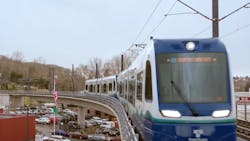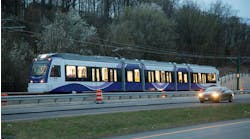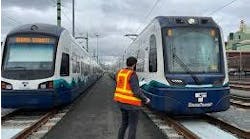Sound Transit begins testing new Link light-rail vehicles during service hours
Sound Transit began testing the new Link light-rail vehicles (LRVs) during service hours Dec. 19.
The agency is conducting burn-in testing necessary to introduce the trains into full service. Largely operating during weekends and late on weekdays, the new LRVs will not board passengers, instead displaying an "out of service" message. Operators will also announce at each station that the train is out of service.
This phase of burn-in testing is one of the last steps before deployment of the vehicles for passenger service. The LRVs will have previously undergone significant qualification testing during non-service hours to reach this milestone in the testing phase.
The first LRV must undergo 1,000 miles of burn-in testing, which is expected to be completed in the first quarter of 2021. Subsequent trains undergo 300 miles of burn-in testing.
"With the start of burn-in testing, we are that much closer to bringing the new Series 2 LRVs online and serving passengers," said Sound Transit CEO Peter Rogoff. "Adding light rail vehicles to our fleet is a critical component of service expansion to Northgate, Lynnwood, Federal Way, Bellevue and Redmond over the next four years."
Series 2 LRVs are expected to be introduced into passenger service later in 2021, which will be the public's first opportunity to experience the new trains first hand. Out-of-service testing of additional new LRVs will occur on a rolling basis through 2024, as delivery and commissioning continues.
Sound Transit ordered 152 new LRVs from Siemens Mobility in Sacramento, Calif. The order will more than triple Sound Transit's current fleet size of 62 LRVs in service. The new vehicles will feature several improvements in on-board systems and passenger experience over the current Kinkisharyo-built fleet. To date, 31 LRVs have been delivered to Sound Transit, with the remaining vehicles to be delivered through 2024.
Each of the new vehicles will provide 70 seats with larger windows, a wider center-car aisle and four bicycle hooks—twice as many as provided currently. Each car will come equipped with dynamic passenger information displays and LED lighting improvements.


